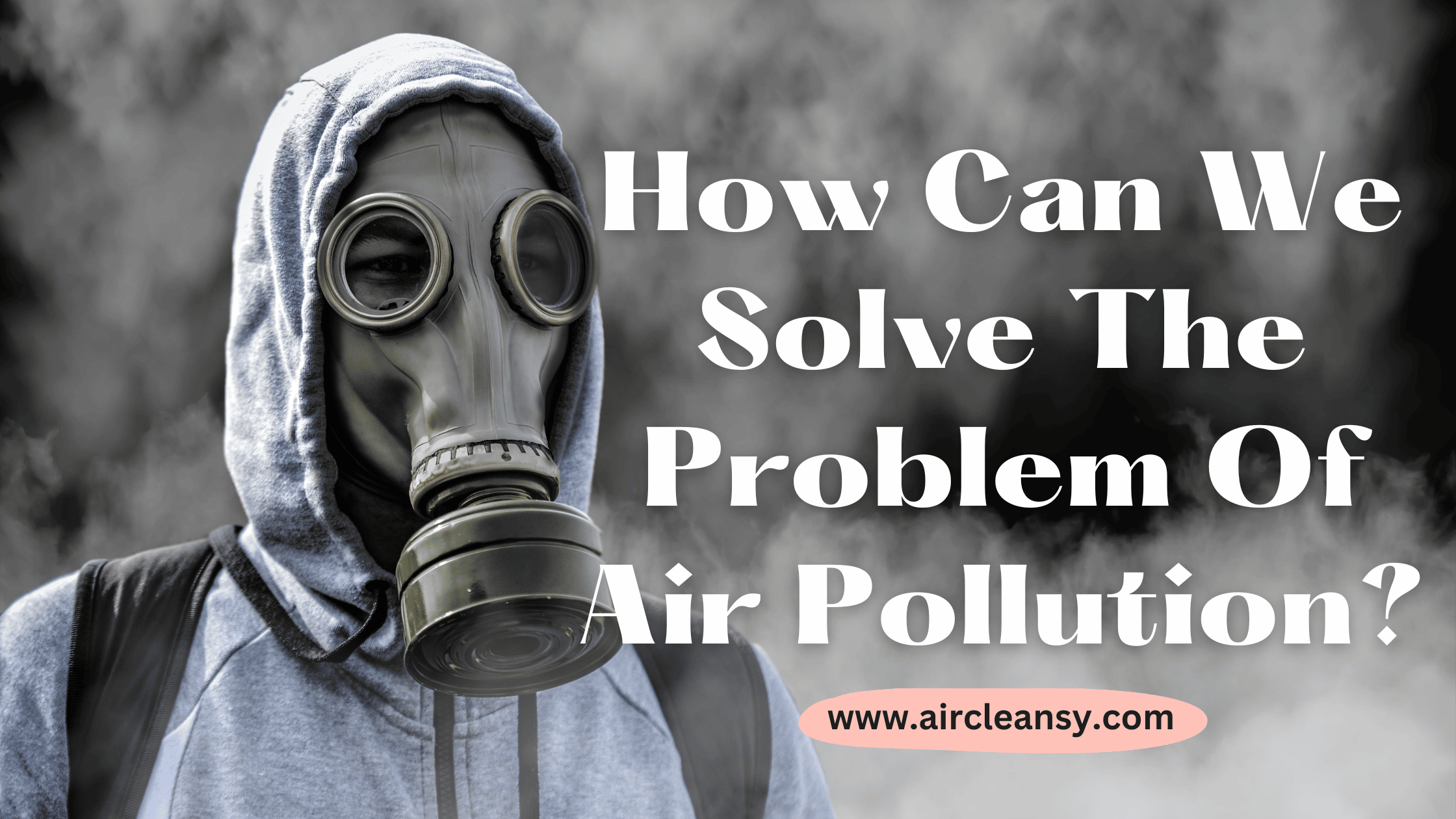Curious to learn about How Can We Solve The Problem Of Air Pollution? Keep reading and find out everything you need to know about the solutions to air pollution!
Unfortunately, air pollution is a global problem that requires both individual and collective action to address. One way to reduce air pollution is to use public transportation or carpool instead of driving. Another way to reduce air pollution is to choose energy-efficient appliances and lightbulbs. Finally, everyone can help reduce air pollution by recycling and composting. Together, we can make a difference in the fight against air pollution.
In this article, we will discuss some of the causes of air pollution, its effects on our health, and what we can do to reduce it. So, let’s get started!

Health Effects From Air Pollution

Air pollution is a serious problem that poses a threat to human health. The most common pollutants are particulate matter, ozone, nitrogen dioxide, and sulfur dioxide. These pollutants can cause a variety of health problems, including respiratory infections, asthma, and heart disease.
Long-term exposure to air pollution can also lead to cancer. In addition to the direct effects on human health, air pollution also contributes to climate change. This further exacerbates the health risks posed by air pollution, as extreme weather conditions can trigger respiratory problems and other health complications. As the effects of air pollution become more widely understood, it is important to take steps to reduce its impact on human health.
What Are the Different Types of Air Pollution?

Air pollution is a serious problem that poses a threat to human health. The most common pollutants are particulate matter, ozone, nitrogen dioxide, and sulfur dioxide. These pollutants can cause a variety of health problems, including respiratory infections, asthma, and heart disease. Long-term exposure to air pollution can also lead to cancer. In addition to the direct effects on human health, air pollution also contributes to climate change.
This further exacerbates the health risks posed by air pollution, as extreme weather conditions can trigger respiratory problems and other health complications. As the effects of air pollution become more widely understood, it is important to take steps to reduce its impact on human health.
The two most common types of air pollutants are particulate matter and greenhouse gases. Particulate matter, or PM, is made up of solid and liquid particles that are suspended in the air. Greenhouse gases, such as carbon dioxide and methane, trap heat in the atmosphere and contribute to climate change.
How does climate change affect air pollution?

Climate change can exacerbate air pollution in a number of ways. For example, warmer temperatures can cause chemical reactions that create smog, while changes in precipitation patterns can lead to dust storms. Additionally, melting polar ice caps can release pollutants that have been trapped in the ice for years. As the Earth’s climate continues to change, it is important to be aware of how it may impact air pollution levels and take steps to reduce pollution where possible.
What are some ways to prevent air pollution?

Air pollution is a major environmental problem that affects cities all over the world. By some estimates, air pollution is responsible for millions of premature deaths each year. While there is no single silver bullet to solving the problem of air pollution, there are a number of steps that can be taken to help reduce its impact. One way to reduce air pollution is to improve the efficiency of vehicle engines.
Another way to reduce air pollution is to use public transportation instead of private vehicles. Additionally, planting trees can help to absorb carbon dioxide and other pollutants from the air. Finally, people can also reduce their own emissions by using energy-efficient appliances and by recycling. By taking these steps, individuals and communities can help to make a dent in the problem of air pollution.
How To Reduce Air Pollution?

Here are 10 tips you can use to reduce air pollution in your city:
- Use public transportation. Buses and trains produce far less pollution than cars and trucks.
- Ride a bike or walk when possible. Not only is this good for your health, but it also cuts down on emissions.
- Avoid idling your car. When you’re stopped in traffic or at a red light, turn off your engine to save fuel and reduce emissions.
- Don’t top off your gas tank. Overfilling releases gas fumes into the air.
- Recycle and compost. This reduces the amount of waste that gets sent to landfills, where it emits methane, a potent greenhouse gas.
- Choose energy-efficient appliances. Look for the ENERGY STAR label when shopping for new refrigerators, washing machines, and other appliances.
- Weatherize your home. This means sealing cracks and gaps to prevent heat from escaping. This not only saves energy but also reduces pollutant emissions from power plants.
- Buy local produce. Transportation emits greenhouse gases, so buying food that’s grown locally reduces pollution.
- Plant trees. Trees absorb carbon dioxide, one of the main greenhouse gases responsible for climate change.
- Get involved. Join an organization working to improve air quality in your city, or lobby your elected officials for stronger environmental regulations.
Everyone has a role to play in reducing air pollution. By following these tips, you can help make your city a cleaner and healthier place to live.
FAQs
Now that you know a little bit more about air pollution, you may have some questions. Here are some frequently asked questions about air pollution to help you get started.
How Does Air Pollution Affect Human Health?
Air pollution can cause a variety of health problems, including respiratory infections, asthma, and heart disease. Long-term exposure to air pollution can also lead to cancer.
How Can We Solve The Problem Of Air Pollution?
One way to reduce air pollution is to improve the efficiency of vehicle engines. Another way to reduce air pollution is to use public transportation instead of private vehicles. Additionally, planting trees can help to absorb carbon dioxide and other pollutants from the air. Finally, people can also reduce their own emissions by using energy-efficient appliances and by recycling.
What Are The Most Common Pollutants?
The most common pollutants are particulate matter, ozone, nitrogen dioxide, and sulfur dioxide. They can come from a variety of sources, including power plants, automobiles, and factories.
What Is The Difference Between Indoor And Outdoor Air Pollution?
Indoor air pollution occurs when there are harmful pollutants present in the air inside a building. Outdoor air pollution occurs when there are harmful pollutants present in the air outside.
What Is Particulate Matter?
Particulate matter, or PM, is made up of solid and liquid particles that are suspended in the air. It can come from a variety of sources, including power plants, automobiles, and factories.
What Are Greenhouse Gases?
Greenhouse gases, such as carbon dioxide and methane, trap heat in the atmosphere and contribute to climate change. They can come from a variety of sources, including power plants, automobiles, and factories.
The Final Words
In this article, we have looked at air pollution, its causes, effects, and some solutions to this problem. We also discussed the different types of pollutants and how climate change affects air pollution.
Please comment below if you have any questions left. Moreover, if you found this article helpful, then share our website AirCleansy with your friends and family. We are dedicated to helping people improve the air quality in their homes and would love for as many people as possible to learn about us.

